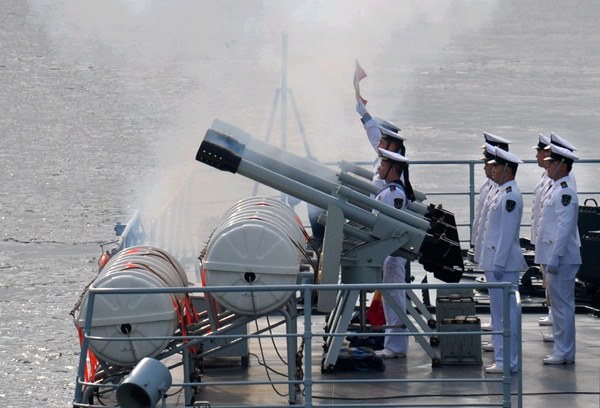China, Russia launch joint naval exercise
By YANG JIE (China Daily) Updated: 2015-08-21 08:45
 |
|
The Chinese fleet arrives at the Russian port of Vladivostok on Thursday to take part in a nine-day naval drill with Russian counterparts. HU SHANMIN/CHINA DAILY |
The Chinese and Russian navies will hold a joint drill on Friday, their second this year.
Around two dozen vessels from both countries will participate in the Joint Sea-2015 exercise in the Peter the Great Gulf, waters off the Clerk Cape, and in and above the Sea of Japan.
The drill aims at consolidating and developing the comprehensive strategic partnership between China and Russia, deepening cooperation and enhancing the ability of the two countries to respond jointly to maritime security threats and defend peace in the area, said Wang Hai, deputy commander of the PLA navy.
The Chinese fleet includes the destroyers Shenyang and Taizhou, the frigates Linyi and Hengyang, the landing craft Changbaishan and Yunwushan, and the supply ship Taihu, which arrived at the Russian port of Vladivostok on Thursday.
Six helicopters, five fixed-wing aircraft, 21 units of amphibious equipment and 200 marines will also join the exercise from China.
The Russian navy will send 16 surface ships, two submarines, 12 naval aircraft, nine amphibious vehicles and 200 marines.
Navies from the two countries will join forces to simulate anti-submarine combat and air defense and other missions. A joint beach landing of troops is also planned, according to a source close to the operation.
The drills "are not targeted at any third party and are not relevant to the regional status quo", and they "are part of an annual exchange program between Chinese and Russian militaries", said the source.
China and Russia have held five joint naval exercises since 2005.
The most recent one, in the Mediterranean, was held from May 11 to 12 this year and was the first in the Joint Sea series. The exercises in May, involving nine surface ships from the two navies, focused on maritime defense, and replenishment and escort, with an aim to boost their capabilities in jointly dealing with security threats at sea.
Xinhua contributed to this story.






